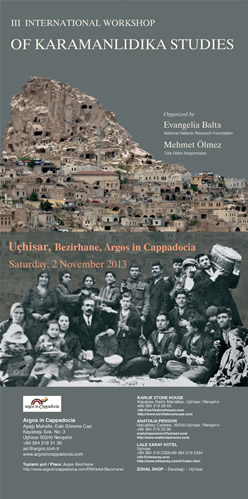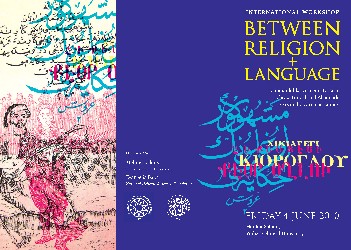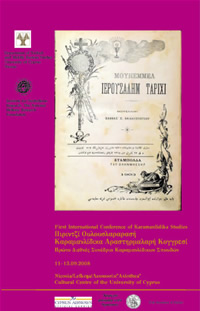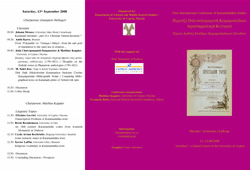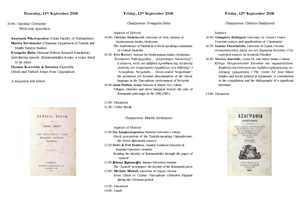Since 1978, Evangelia Balta has been involved with the study of karamanlidika philology and its world: printed matter, authors, publishers, reading public. Her priority was compiling the bibliography of the karamanlidika book. Continuing the work of Severien Salaville – Eugène Dalleggio, she has added three further volumes to their bibliography, in 1987 (2 volumes) and 1997 (1 volume). Her quest for karamanlidika titles not recorded in the bibliography, in libraries and archives all over the world, inevitably revealed to her the treasure-trove of the periodic Press. Since 1984, she has been creating systematically in the Centre for Asia Minor Studies (Athens) an archive of photocopies of volumes of various karamanlidika periodicals and newspapers. In 1990 she located and reproduced volumes of the periodicals Αγγελιαφόρος (The Weekly Anggeliaforos) and Αγγελιαφόρος τζοτζουκλάρ ιτζούν, which were published by the American Bible Society (Amerikan Han, Istanbul). These photocopies are kept now in the archive of collector Stratis Tarinas (Athens).
Evangelia Balta is preparing the new edition of the Karamanlidika Bibliography, in which is recorded the testimony of Ottoman archival material on the history of the publication (the permit to publish or its prohibition) and references are made to the bibliographies of Ginis-Mexas, Ph. Iliou, M. Özege, the Stepanyans. Recorded too are the corresponding Greek, Osmanli, Armeno-Turkish publications, with the aim of enhancing the reciprocal influences in the literature-bibliographical side of loans and counter-loans. As is well known, the culture that was shaped in the Ottoman Empire functioned, as far as political circumstances permitted, as a galaxy, with satellite regional cultures that were in mutual contact with each other and concurrently with the whole.
Her future aim is to compile the analytical bibliography of the newspapers and periodicals which circulated, with a team of researchers and post-graduate students. Ultimate aim is to create an encyclopaedic lexicon which will include information on the biography and the work of authors, translators, publishers and funders of karamanlidika printed matter.
Since 2011 Evangelia Balta has been conducting a Seminar on Karamanlidika Studies in the Intensive Ottoman and Turkish Summer School at Cunda, Ayvalık (OTTOMAN STUDIES FOUNDATION) Dr Balta’s seminar introduced students to the main issues in the field of Karamanlidika Studies and focused on research opportunities in the Başbakanlık Osmanlı Arşivi and the Archives in the USA and Europe. The purpose of the seminar was to familiarize students in Ottoman Studies with a lesser-known aspect of Ottoman life and culture, the Turkish-speaking Orthodox Christians known as the Karamanlıs, focusing on a key cultural product, Karamanlı printed materials. While particular attention is paid to nineteenth-century and early twentieth-century Ottoman sources on the history of Karamanlı printing, key aspects of the history of the Karamanlıs themselves in Anatolia and the major urban centres of the empire are also discussed through an examination of relevant Ottoman sources like Tahrir Defterleri and Kadı Sicilleri.2013 III International Workshop of Karamanlidika Studies Organized by Evangelia Balta (National Hellenic Research Foundation) Mehmet Ölmez (Türk Dilleri Araştırmaları) Τhe purpose of this Workshop is to bring experts specialising in the subject into contact with postgraduate students who have taken up Karamanlidika studies or who intend to become involved with this sector during their academic life, so as to create the necessary network of associates that will promote this academic field which now appears to stand independently.
The aim of the Workshop’s organizers was for conference proceedings to focus on modules based on material largely unexploited or unknown up to now and to present unknown Karamanlidika collections. They sought to make the Workshop the beginning of systematic research into sources as yet unexplored, like Karamanli periodicals and newspapers, which open up new prospects and provide a wealth of information on the history of Turkish-speaking Orthodox Rums in the Ottoman Empire. At the same time central themes in this workshop continue to be the linguistic approach to Karamanlidika texts, studies which examine the effect exerted on the Karamanli literary production by the corresponding production in Europe and Greece, and the other gayr-i muslim literatures in the Ottoman Empire, as well as the effect Karamanli book production had on corresponding Turkish philology.
The Workshop is to be held at Üçhisar in Cappadocia (Bezirhane, Argos in Cappadocia, Saturday, 2 Νovember 2013) and it is the third in a series of International Conferences on Karamanlidika Studies.
2010 Histories of Karamanlis and Karamanlidika Prints
Histories of Karamanlis and Karamanlidika Prints
In April 2010, the Turkish Cultural Foundation awarded a grant in the amount of $ 25,700 to Dr. Evangelia Balta in support of a research project initiated in 2009. The research project seeks to indentify and publish Ottoman archival materials on Karamanlica / Karamanlidika publications, that is, books, magazines, newspapers and other printed matter which were published in Turkish written in the Greek alphabet during the period between the early 1800s and the beginning of the 20th century. The project’s immediate aim is the publication of a scholarly volume (entitled ”Histories of Karamanlis and Karamanlidika Prints”) which will deal with aspects of the history of the Turkophone Orthodox populations and the Karamanlidika prints from a variety of viewpoints, according to the provenance of the sources (Ottoman, Greek and Western sources). The project’s long-term aim is to collect information on Karamanlidika prints which will result in a revised and enhanced edition of the Karamanlidika Bibliography. Dr. Nurdan Şafak, Ayşe Kavak and Dr. Raif Ivecan are members of the project team.
“Between Religion and Language” Karamanlidika, Armeno-Turkish, Hebrew-Turkish and Aljamiado Texts in the Ottoman Empire
The Workshop at the Yıldız Technical University on Friday June 4, 2010.
Venue: Hünkar Salonu, Yıldız Technical University Organized by Mehmet Ölmez (Yıldız Technical University) Evangelia Balta (National Hellenic Research Foundation) Presented at the workshop were papers on Turkish language texts written in various alphabets (Greek, Armenian, Hebrew) as well as one paper on Greek Aljamiado literature (vernacular Greek in Arabic script). Since the First International Conference of Karamanlidika Studies in 2008 dealt exclusively with Karamanlidika publications (Turkish texts in Greek script) and the Turcophone Orthodox population of Asia Minor, this year the subject was extended to embrace themes related to the intellectual production of other non-Muslim millets of the Ottoman Empire, namely the Turcophone Armenians and the Turcophone Jews. Our goal is to study, both synchronically and diachronically, the mosaic composed of these gayr-i muslim populations, and bring to light the communication channels within these populations, at least those discernible in their culture. To make a contrast, a paper on Greek Aljamiado literature presented the opposite phenomenon in the 19th century Balkans, with the Greek language being the lingua franca and the Muslims of Rumeli writing Greek in the Arabic alphabet. Focusing always on the Turkish-speaking Orthodox Christian population, the Karamanlis, and its cultural product, Karamanlidika printed material, the organizers of this one-day workshop brought together scholars from Turkey, Greece, Cyprus, England and Holland in their aspiration to emphasize some aspects of this particular manifestation of cultural life in the multi-ethnic Ottoman Empire, and thus stimulate research and debate on these literatures which have vanished forever.2008 1st International Conference of Karamanlidika Studies
In 2007, she and Matthias Kappler (University of Cyprus) decided to organize an Ιnternational Conference of Karamanlidika Studies. The conference is intended to inaugurate future scientific meetings on a regular basis, in the hope of formulating a first approach to the intricate subject, and to create a scientific platform for further research and cooperation between scholars. As the main problems of research in “Karamanlidika” are the lack of analytical studies, the absence of scholarly exchange between researchers, as well as the politicization and political manipulation of the subject, the conference intends to bring together specialists in the field to present papers dealing expressly with the phenomenon, without political dilatation and expansion.
The 1st International Conference of Karamanlidika Studies was held from 11 to 13 September 2008 at the “Axiothea” Cultural Centre of the University of Cyprus. It is organized by the Department of Turkish and Middle Eastern Studies/University of Cyprus (Nicosia) and The National Hellenic Research Foundation (Athens). The Conference brought together scholars from Cyprus, Greece, Turkey, Belgium, France, Italy, and Norway, with the aim of exploring the always plural and complex stories of the Turkish-speaking Orthodox Christian population and its cultural product, the Karamanlidika printed matter.
